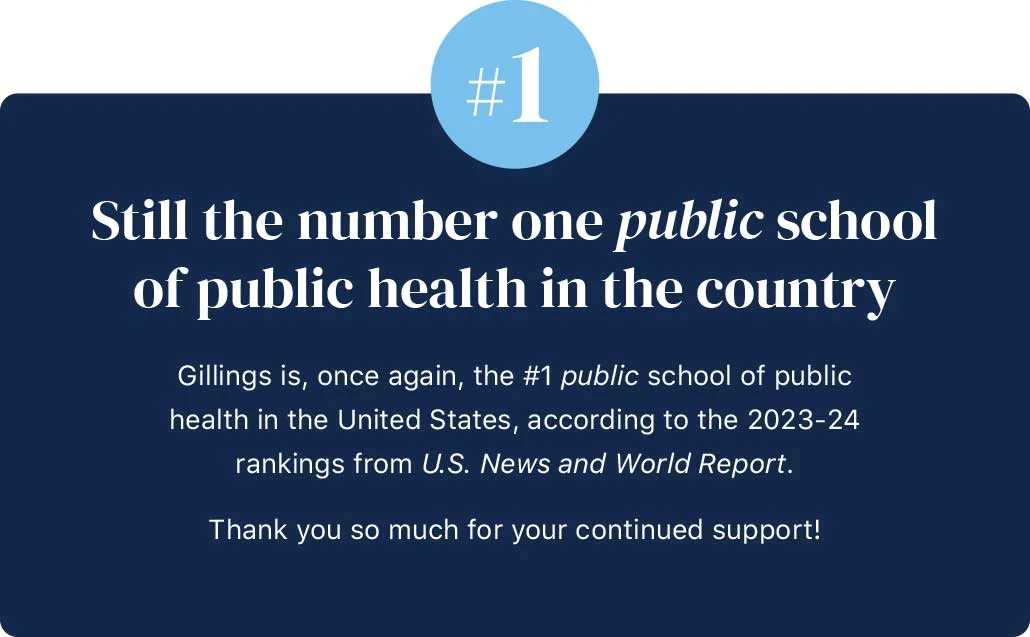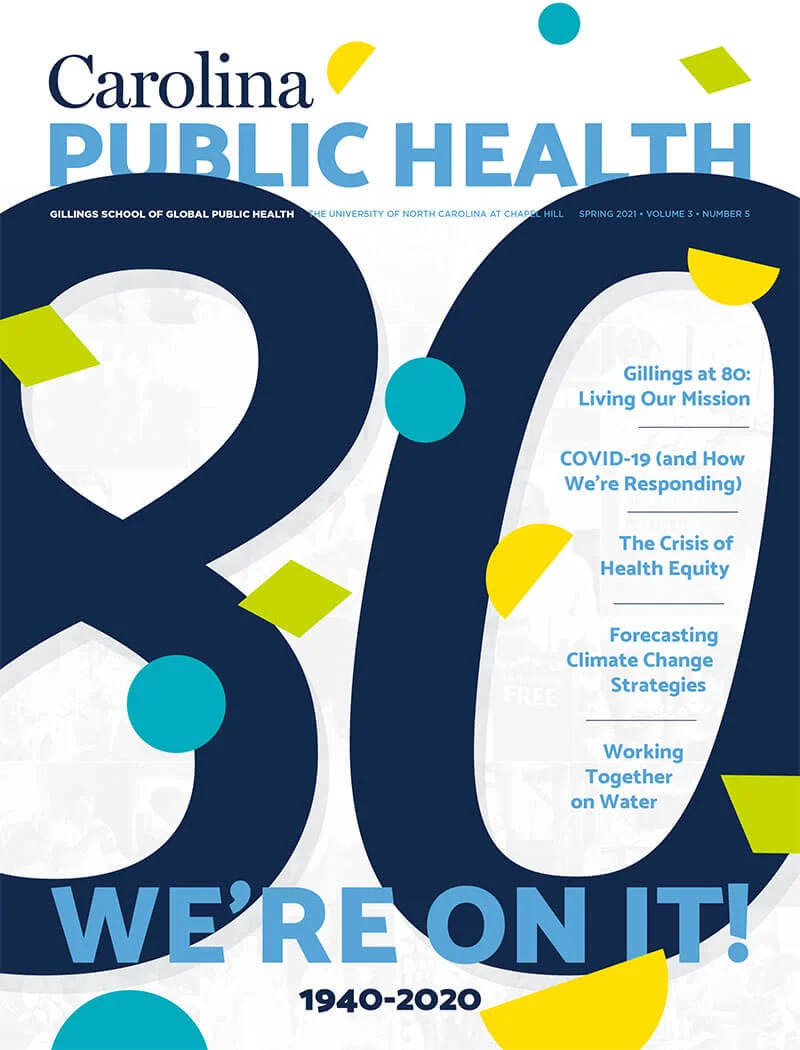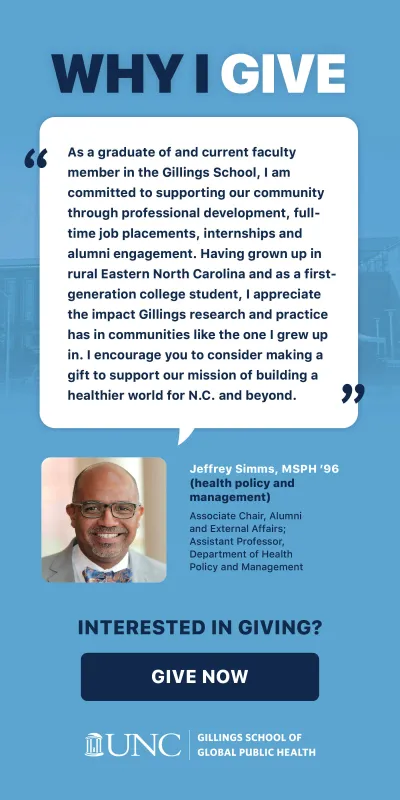This issue of our magazine provides a glimpse (albeit selective) into the deep and varied world of Gillings in the pandemic.
More than a year ago, we paused the magazine to address the deluge of information needs that arose every day as we navigated life, learning and research in the pandemic. As fall 2020 unfolded and the campus moved from on-site to remote within the first two weeks of the semester because of rapidly rising COVID-19 cases, we decided it was time to resume work on the magazine. The current issue is both here-and-now and a look back at some highlights of our 80 years.
We were the nation’s fourth school of public health and first public school. We still are the top public school and proud of it. In this issue, we highlight ways that our Master of Public Health classes deliver value to communities through practice — one of Gillings’ strengths, even as students are being trained. We focus on big contemporary challenges, such as climate impact, where it is imperative that solutions are found soon. We highlight our collaborative research across North Carolina on PFAS, a class of chemicals that harms life and the environment. Read on for much more.
As SARS-CoV-2 evolved from a virus with pandemic potential to a global pandemic, our focus, research, education and practice tracked with it. Early on, we created a COVID-19 working group to coordinate activities across our school. In the early stages, our faculty members focused on understanding the novel coronavirus and developing new methods to study and find it. Water research experts developed innovative methods to detect SARS-CoV-2 in wastewater — an early warning system for congregate living and working sites. Air-quality experts contributed to understanding how droplets function as disease promoters indoors. Health behavior faculty members advised how to motivate people to follow essential practices to reduce viral spread. Health policy experts and others advised state, national and global governments, and non-governmental organizations. Several epidemiology faculty members leveraged their experience with Ebola in 2016 to fast-track development of vaccines for COVID-19 in partnership with clinical and pharmaceutical colleagues. One faculty member was asked to serve on the leadership committee that designed treatment trials for COVID-19 worldwide, known as ACTIV and another is on the leadership team for vaccine trials under the umbrella of Operation Warp Speed.
As SARS-CoV-2 evolved from a virus with pandemic potential to a global pandemic, our focus, research, education and practice tracked with it.
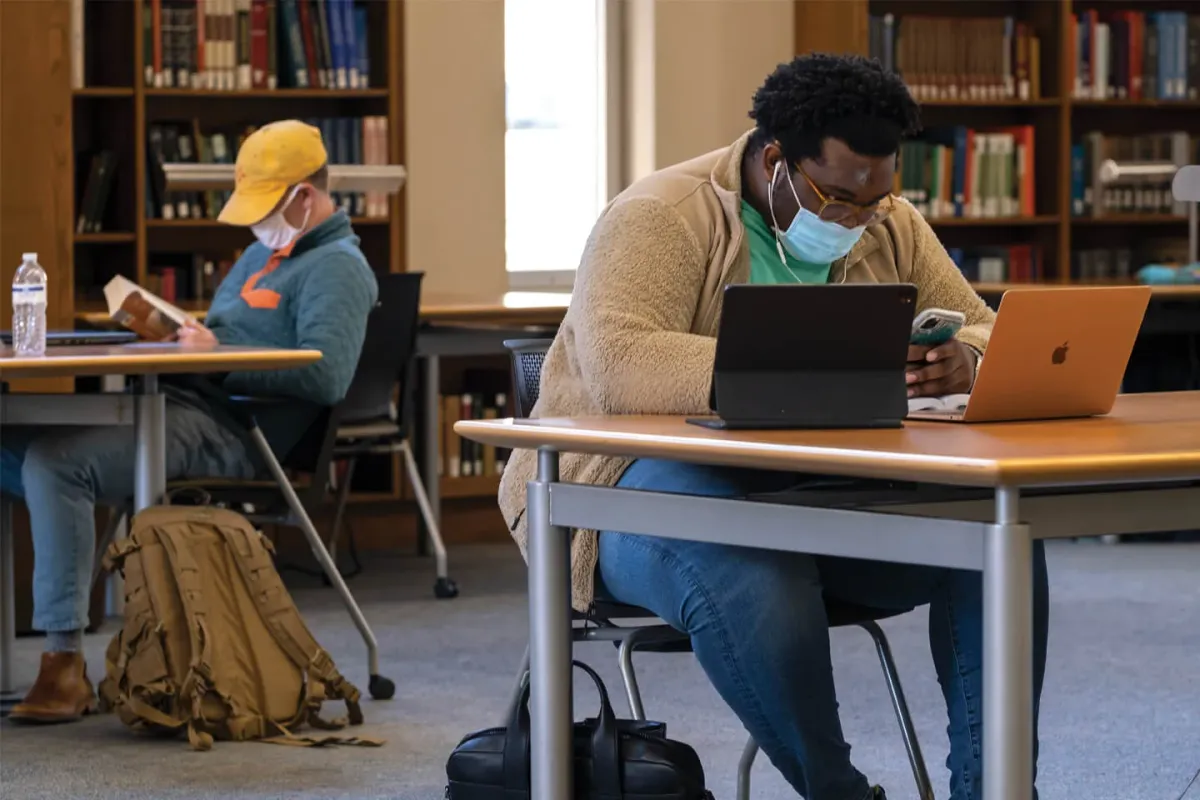
During what should have been spring break in 2020, Gillings faculty members, like others across UNC-Chapel Hill and around the country, pivoted from in-person classroom teaching to remote teaching—in under two weeks! They and our students adapted—with some challenges. We have lived in a Zoom world for more than a year.
COVID-19 cases continued to rise throughout summer 2020, accompanied by increasing hospitalizations and death rates around the state, country and world. Students did internships and practica helping organizations deal with the consequences of viral spread. Faculty members rose to meet the pressing needs of the public, especially underserved populations, for information regarding SARS-CoV-2. Health equity was always front and center. One of our faculty members created a new webinar series on Emergency Preparedness, Ethics and Equity. Two of us were part of a National Academy of Medicine committee that planned a pandemic webinar series reaching thousands of people. Another wrote regular articles about ethical issues for Medium. We planned and executed a new COVID-19 course to meet in-person credit requirements for international students. Several faculty members collaborated with colleagues locally, with legislative support, to create a dashboard with essential SARS-CoV-2 and COVID-19 information specific to N.C. localities.
Over Memorial Day weekend in 2020, George Floyd was killed, and intense discussions about race, structural racism and inequity were happening everywhere, including in our school. Our school’s focus on health inequities never has been greater or more determined.
We are living through an infectious disease pandemic, a racism pandemic and an economic pandemic and are determined to be part of solutions. Deans and program directors from schools and programs around the U.S. have had powerful, regular conversations about these issues. We joined with other schools and programs in responding to executive orders that placed additional restrictions on foreign students, decimated environmental regulations and prohibited training that included structural racism. Students were hard hit, losing the in-person support communities on which they depended. Our student services leaders increased efforts to help people cope, like Wind Down Wednesdays. We hosted COVID conversations to provide opportunities for faculty, staff and students to learn what we were doing, ask questions and voice opinions. We are a community.
Our experts on vaccines and communication were central knowledge sources for our school, university, local and state health authorities, and national and global bodies as vaccination efforts rolled out and gathered steam. And still, much of our usual research and other activities continued.
This issue of our magazine provides a glimpse (albeit selective) into the deep and varied world of Gillings in the pandemic. I am awed, amazed and grateful for the remarkable work that goes on every day at Gillings (onsite and remotely) and by our alumni in thousands of locations around the world. Our commitment to equity, action, acceleration and public health impact, always strong, grew stronger during the pandemic. We are a school grounded in practice and the application of research. Our proud history speaks to that. The future demands it. Thank you to our many friends and supporters. We would not be a top school without you!
Wishing you good health, vaccinations and better times ahead.
With gratitude to all,

Barbara K. Rimer
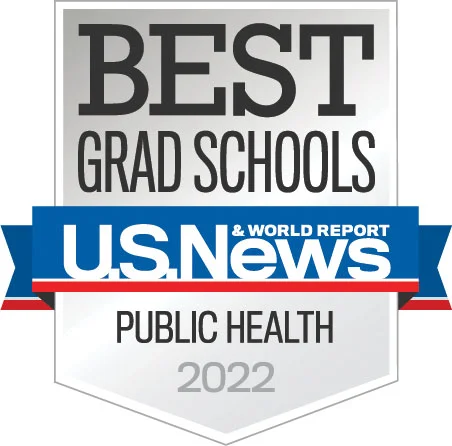
Still the number one public school of public health in the country
Once again, the UNC Gillings School of Global Public Health has been ranked the number one public school of public health in the United States by U.S. News and World Report – and number two overall. This is the fourth consecutive period in which the Gillings School has received this ranking. In the 2020 rankings, Gillings shared second place; in the new 2022 edition, Gillings stands alone in the second position.


